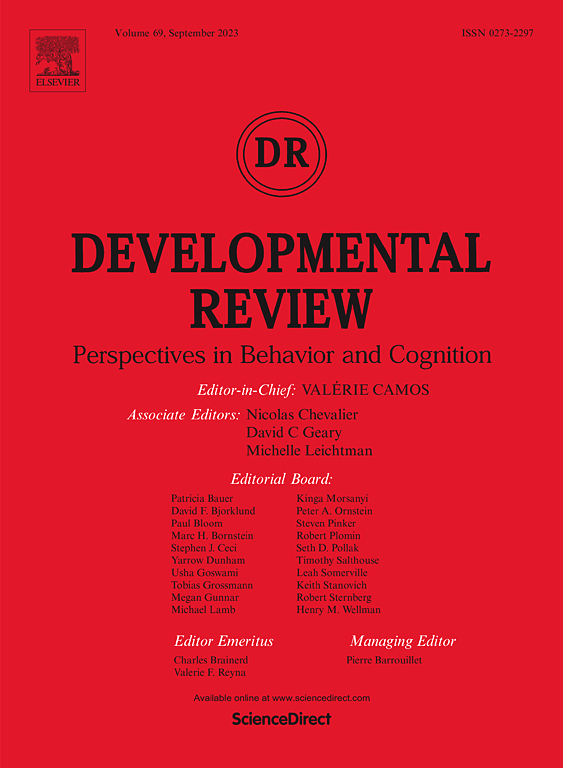Network selection and influence effects on children’s and adolescents’ internalizing behaviors and peer victimization: A systematic review
IF 5.7
1区 心理学
Q1 PSYCHOLOGY, DEVELOPMENTAL
引用次数: 13
Abstract
In interpersonal models of developmental psychopathology, friendships and affiliations with peershave been considered as both consequences and determinants of children’s and adolescents’ internalizing behaviors and peer victimization. Longitudinal stochastic actor-oriented models (SAOMs) allow developmental researchers to disentangle peer selection processes where children or adolescents choose friends who are similar to themselves in internalizing behaviors or peer victimization from peer influence processes where children or adolescents become more similar to their friends over time in internalizing behaviors or peer victimization. This paper highlights the methods and results from a systematic review that screened 1,447 empirical articles and located 28 using SAOMs to understand the interplay between peer social networks and internalizing behaviors or peer victimization. The results provide some evidence for both peer selection and influence related to depression, social anxiety, and peer victimization. Additionally, the results provide insight into directions for additional substantive and methodological research. Based on the findings of this review, future research is recommended that considers specific tests of peer selection and influence mechanisms, developmental and gender differences, individual and contextual moderators, multiplex relationships, methodological quality, and direct replication of prior studies.网络选择对儿童青少年内化行为和同伴伤害的影响:系统回顾
在发展精神病理学的人际模型中,与同伴的友谊和从属关系被认为是儿童和青少年内化行为和同伴受害的后果和决定因素。纵向随机行动者导向模型(SAOM)使发展研究人员能够将儿童或青少年在内化行为或同伴受害方面选择与自己相似的朋友的同伴选择过程与儿童或青少年随着时间的推移在内化行为和同伴受害方面与朋友更相似的同伴影响过程区分开来受害本文强调了一项系统综述的方法和结果,该综述筛选了1447篇实证文章,并定位了28篇使用SAOM来理解同伴社交网络与内化行为或同伴受害之间的相互作用的文章。研究结果为同伴选择和影响抑郁、社交焦虑和同伴受害提供了一些证据。此外,研究结果为进一步的实质性和方法论研究提供了方向。根据这篇综述的结果,建议未来的研究考虑对同伴选择和影响机制、发展和性别差异、个人和情境调节因素、多重关系、方法论质量以及对先前研究的直接复制的具体测试。
本文章由计算机程序翻译,如有差异,请以英文原文为准。
求助全文
约1分钟内获得全文
求助全文
来源期刊

Developmental Review
PSYCHOLOGY, DEVELOPMENTAL-
CiteScore
11.00
自引率
3.00%
发文量
27
审稿时长
51 days
期刊介绍:
Presenting research that bears on important conceptual issues in developmental psychology, Developmental Review: Perspectives in Behavior and Cognition provides child and developmental, child clinical, and educational psychologists with authoritative articles that reflect current thinking and cover significant scientific developments. The journal emphasizes human developmental processes and gives particular attention to issues relevant to child developmental psychology. The research concerns issues with important implications for the fields of pediatrics, psychiatry, and education, and increases the understanding of socialization processes.
 求助内容:
求助内容: 应助结果提醒方式:
应助结果提醒方式:


